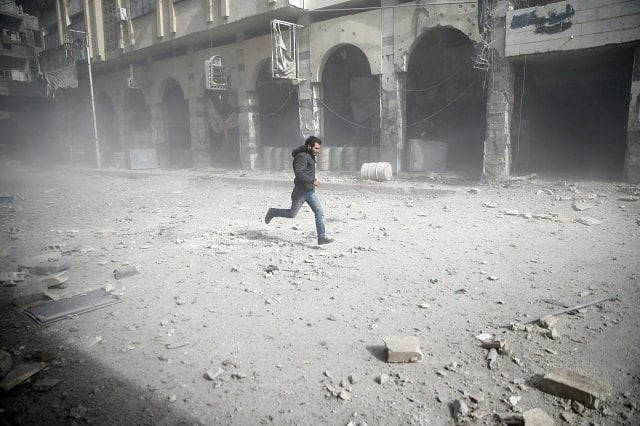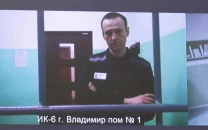Russia offers rebels safe passage out of eastern Ghouta
Russian defence ministry allows rebels to leave with<br /> their families and personal weapons

A man is seen running after an air raid in the besieged town of Douma in eastern Ghouta in Damascus, Syria, February 6, 2018 PHOTO: REUTERS
The Russian defence ministry said rebels could leave with
their families and personal weapons through a secure corridor out of eastern Ghouta, where Moscow-backed government forces are
making rapid gains in a fierce assault.
The Russian proposal did not specify where the rebels would
go, but the terms echo previous deals by which insurgents have
ceded ground to Assad and been given safe passage to other
opposition-held territory near the Turkish border.
"The Russian Reconciliation Centre guarantees the immunity
of all rebel fighters who take the decision to leave eastern
Ghouta with personal weapons and together with their families,"
said the defence ministry statement.
Vehicles would "be provided, and the entire route will be guarded", it added. The spokesperson for one of the main rebel groups in eastern
Ghouta, Failaq al-Rahman, said Russia was "insisting on military
escalation and imposing forced displacement" on the people of
eastern Ghouta, where the United Nations has said some 400,000
are living.
The Syrian army has captured more than a third of the
enclave in recent days, threatening to slice it in two. It has
pressed ahead despite Western accusations it has violated a
ceasefire.
The Syrian Observatory for Human Rights says fierce
government bombardment of eastern Ghouta has killed 780 people
since Feb. 18, making this one of the deadliest campaigns of a
war entering its eighth year.
Assad said on Sunday the Syrian army would continue the push
into eastern Ghouta, an area of farmland and towns just outside
Damascus which government forces have encircled since 2013. Many civilian residents have fled from the frontlines into
the town of Douma.
Assad and his allies regard the rebel groups that hold eastern Ghouta as terrorists, and say a U.N. Security Council
resolution demanding a country-wide ceasefire does not apply to
operations against them.
The eastern Ghouta fighting follows a pattern used in other
areas recaptured by the government since Russia entered the war
on Assad's side in 2015, with sieges, bombardment and ground
offensives eventually forcing rebels to agree to leave. For the rebels fighting to oust Assad, the loss of eastern
Ghouta would mark their heaviest defeat since the battle of
Aleppo in late 2016 and end their ability to target the capital.
Rebel shelling on Damascus has killed dozens of people during
the last two weeks, state-run media has said.



















COMMENTS
Comments are moderated and generally will be posted if they are on-topic and not abusive.
For more information, please see our Comments FAQ